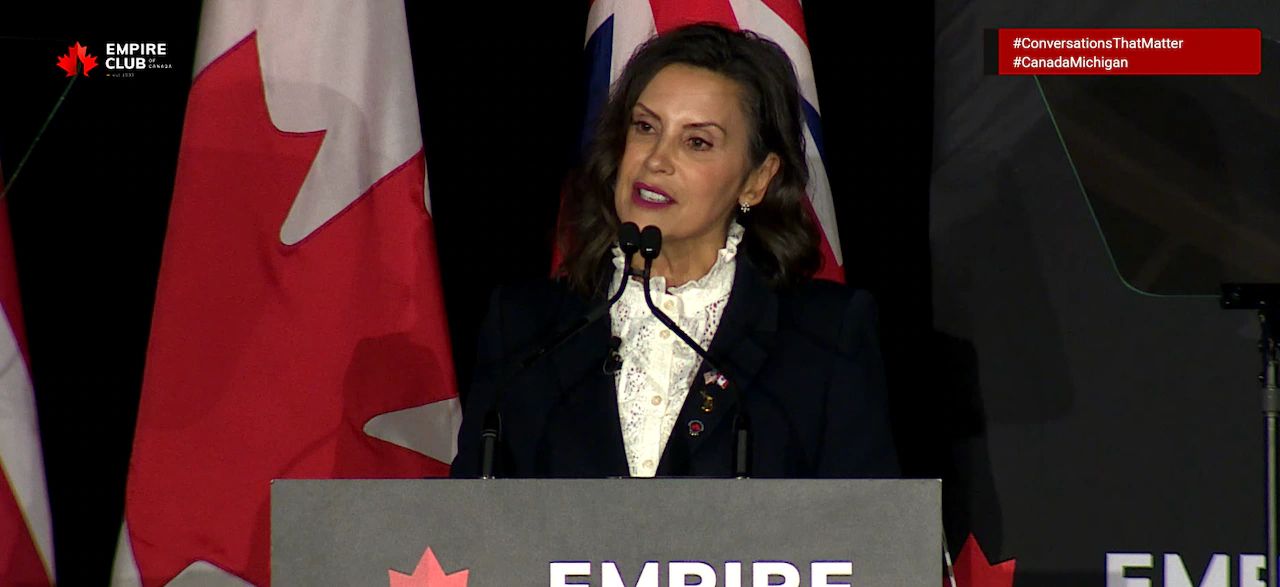
TORONTO – As a new round of Trump administration tariffs took effect Oct. 1, Michigan Gov. Gretchen Whitmer spoke in Toronto about the damage she said they’ve caused to the U.S.-Canada relationship.
“We’re shooting ourselves in the foot with a chaotic national tariff policy,” Whitmer said.
During a nearly 20-minute speech in Toronto, Whitmer criticized President Donald Trump’s approach to imposing tariffs that she said are damaging the economic ties and trade relationship between the two countries – and handing China an edge.
“The Canadian-American relationship was built over generations, and the amount of damage that has been done at such a small period of time is just so incredibly disheartening and destructive,” she said.
Whitmer also spoke about the importance of the partnership between Canada and Michigan, despite federal policy changes.
Her Oct. 1 comments came during an address in Toronto on “The Canada-Michigan Relationship,” held by the Empire Club of Canada, a longstanding speaker’s forum, and the American Chamber of Commerce in Canada.
Since the start of Trump’s second term, Canadians have boycotted American products, and provinces have pulled American-made alcohol from the shelves. Canadian fans have booed during the U.S. national anthem at sports games, and tourism to Michigan and the U.S. has declined.
Travel data from earlier this year showed fewer Canadians traveling into Michigan through port cities and airports. A drop in visitors could have an impact – not yet determined – on Michigan’s tourism economy, which generates $400 million from Canadians every year.
Pete Hoekstra, the U.S. ambassador to Canada and former chair of the Michigan Republican Party, has said pre-clearance locations in Canada – which allows passengers to clear customs before entering the U.S. – have seen declining numbers due to less travel.
Hoekstra has also expressed frustration over what he’s called “anti-American sentiment” in Canada, including from politicians.
During an event hosted by the Halifax Chamber of Commerce in September, Canada’s CBC News reported Hoekstra said what has been most unexpected since starting his new role in April has been the country’s feelings about the U.S.
“I’m disappointed that I came to Canada — a Canada that it is very, very difficult to find Canadians who are passionate about the American-Canadian relationship,” he said.
During Whitmer’s appearance in Toronto, she was asked by Canadian journalist and author Steve Paikin why, “in the midst of a chaotic tariff policy that changes every day,” should Canada trust Michigan as a partner?”
Trump has levied multiple tariffs against Canada, among numerous other trading partners, since taking office Jan. 20.
He’s said they’re necessary to improve the U.S. economy in the long term, combat a global trade imbalance, return domestic manufacturing jobs and staunch a flow of illicit drugs into the country.
Trump’s latest tariffs, taking effect on Oct. 1, include 100% on pharmaceutical drugs, 50% on kitchen cabinets and bathroom vanities, 30% on upholstered furniture and 25% on heavy trucks. Some have pointed to the furniture tariffs as possibly impacting Canadian lumber producers.
In her speech, Whitmer called the tariff policy chaotic.
“Over the past 10 months, the federal administration has slapped tariffs on nearly every country, including yours,” Whitmer said. “They’ve negotiated some deals, retracted others, and some fluctuate, depending on the day, which continues to stoke uncertainty and sow distrust.”
But she also spoke about the importance of continued partnership, highlighting the two countries’ long relationship with a laundry list of commonalities: overlapping supply chains, a strong agricultural industry, shared borders on the Great Lakes, “a love of hockey and craft beer.”
She pointed out the high volume of goods crossing the busiest international border in North America between Detroit and Windsor, Canada, “driving more than a quarter of the $700 billion in annual trade” between the two countries.
“More goods cross the Ambassador Bridge than the U.S. trades with France,” she said.
Earlier this year, Hoekstra said America’s northern neighbor and second-largest trading partner will always have some level of tariffs imposed on its goods under the Trump administration. He believes they’ll lead to a trade deal, which he said is both possible and necessary.
At that time, Hoekstra also said the deep personal, business and security relationships between Canada and the U.S. remain and can’t easily be undone.
Whitmer spoke differently.
“I worry how long it’s going to take to earn back that trust and confidence and pride in that long-term relationship,” she said.
“The tone, the insults coming out of Washington, D.C. (are) not just unwise and unnecessary, they’re also unjustified. They’re unproductive.”
She said she can’t control the national tariff rate, but plans to continue to “use my voice,” taking her requests for tariff relief to the White House.



